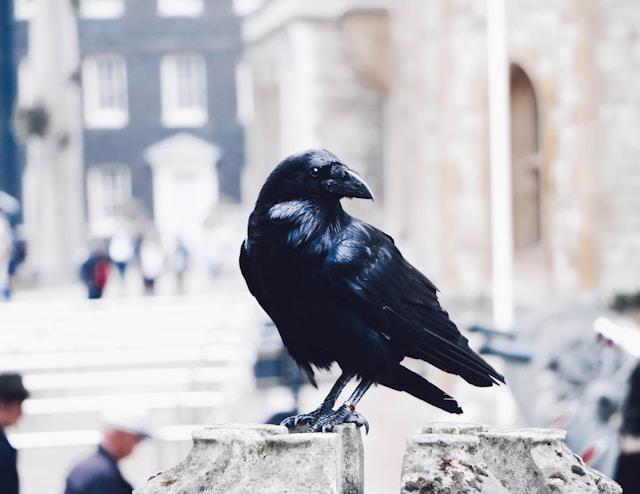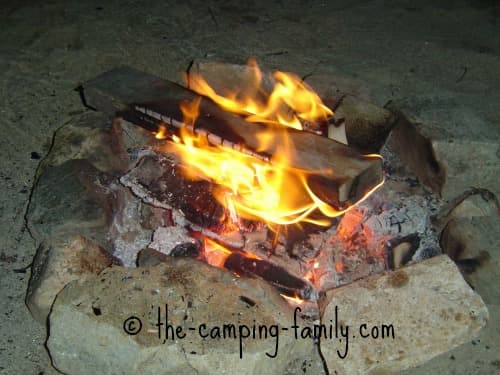Short Campfire Ghost Stories
Delight your family at your next campfire by telling these short campfire ghost stories for kids. They are not too scary, and are great fun to tell as well as to listen to!
Telling stories around the campfire is a great way to end the day. This might become one of your favorite camping traditions!
Tips for telling short campfire ghost stories
Keep your audience in mind
Some children get very scared by ghost stories - even very silly ghost stories like these one. Wait until they are older.
In the meantime, sing campfire songs together!
Some sensitive children might enjoy these stories if you are careful in the telling. Choose a gentler tone of voice and make the story silly, rather than scary.
Make the story your own
You could read this story to your family - but it will be much more effective if you tell it in your own words.
You don't have to memorize every detail. Just learn the general idea of the story, and add your own details as you go along.
Be dramatic!
If you have bigger kids who enjoy being scared in a deliciously fun way, ham it up! Make your voice spooky. Pause for effect. Use sound effects. Have fun!
CLAM Pop Up Screen Tent
Keep the bugs out with this pop up tent! Quick to set up and water resistant.
Read more at Amazon here and find the best price!!
“As an Amazon Associate, we earn from qualifying purchases.”
Short Campfire Ghost Stories #1
The Ghost of The Bloody Finger
This scary story turns into a funny story at the very end.
Be sure to make the ghost’s voice very mysterious and spooky. Have him get louder and louder and scarier and scarier as the story progresses.
Then, at the last sentence, change his voice completely. Make him sound conversational and friendly.
The story
In a small town not far from here, there was an old abandoned house. No one ever went near it because everyone said that it was haunted.
One day, a bunch of local people were sitting in a coffee shop, chatting about bravery.
One man in particular was bragging loudly. “I’m not afraid of anything!” he boasted.
“Oh yeah?” asked his buddy. “I’ll bet that you aren’t brave enough to spend a night alone in that old abandoned house!” The boaster didn’t want to admit that he was afraid, so he agreed to sleep in the house that very night.
At dusk, he arrived at the house alone. He checked every room and found nothing unusual. He chose an upstairs bedroom, spread out his sleeping bag on the floor, and tried to sleep.
He had just dozed off when he heard a faint noise from downstairs. He strained to hear what it was. It sounded like someone moaning these words:
“I am the ghost of the bloody finger! I am in the front hall!”
The man told himself that he was just imagining things. It must be the wind, he thought.
But then he heard, a bit louder,
“I am the ghost of the bloody finger! I am at the bottom of the stairs!”
“My imagination is running wild!” thought the man. “I am just going to go to sleep, and soon it will be morning.”
But then he heard, even louder,
“I am the ghost of the bloody finger! I am at the top of the stairs!”
The man dove inside his sleeping bag, but he could still hear the ghost coming closer.
“I am the ghost of the bloody finger! I am in the upstairs hall!”
The man hid his head under his pillow, but he could hear the ghost coming even closer.
“I am the ghost of the bloody finger! I am at the bedroom door!”
The man was shaking with terror. The door creaked open.
“I am the ghost of the bloody finger! I am in the bedroom!”
The ghost paused in the doorway.
“I am the ghost of the bloody finger!” (pause) “Do you have a bandaid?”
Short Campfire Ghost Stories #2
Rap, Rap, Rap
Here's another classic scary and funny ghost story. Be sure to make your voice very mysterious when you say the last sentence. Pause dramatically before revealing the last words.
The story
There was once a woman who inherited an old house. The neighbors told her that it was haunted, but she didn’t believe them.
When she inspected the house, she was delighted to see that it was completely furnished. She didn’t see anything out of the ordinary, and she moved right in.
On her first night in the house, she got into bed happily. She was just drifting off to sleep when she heard an odd sound, way off in the distance. It sounded like this: “Rap, rap, rap.”
She tried to ignore the sound, but she couldn’t. Finally she decided to get out of bed and investigate.
When she opened her bedroom door, the sound was louder: “Rap, rap, rap”.
She walked down the hallway. The sound got louder: “Rap, rap, rap”.
She headed downstairs. Now it was even louder! “Rap, rap, rap.”
She went into the dining room. It was so loud! “Rap, rap, rap.”
The sound seemed to be coming from a corner of the room. She walked in that direction. “Rap, rap, rap.”
There was a chest of drawers in the corner. The sound was overwhelming now. “Rap, rap, rap.”
She opened the top drawer. There was nothing there.
“Rap, rap, rap.”
She opened the second drawer. There was nothing there.
“Rap, rap, rap.”
She opened the third drawer. There was nothing there.
“Rap, rap, rap.”
She opened the bottom drawer - and saw ……… a roll of wrapping paper!
Short Campfire Ghost Stories #3
The Big Toe
This is a story that is not too scary for young children and can actually be quite funny. This traditional Southern tale should be told in a serious tone.
The story
A woman is gardening when she digs up a hairy toe. She brings it in the house and puts it in a jar. When she goes to bed that night, she hears the wind moaning and groaning and then she hears “Where is my Hair-r-r-y To-o-e?”
She creeps further under the covers as the house creaks and cracks and she again hears, “Where is my Hair-r-r-y To-o-e?”
Continue this story as long as you wish, with more details about the scary noises in the house and repeating the question “Where is my Hairy Toe” more forcibly and louder.
Finally, say “Where is my Hair-r-r-y To-o-e?” in a low, menacing voice and then jump up, point at the listeners, and scream, “You’ve got it!”
The following stories are a bit longer. To build the suspense, tell them slowly, with a great deal of vocal expression.
Short Campfire Ghost Stories #4
The Lighthouse
Jack's favorite painting reminded him of the lighthouse in town.
Jack was a writer who moved to a seaside town. He traveled around the coast to write stories about the people who lived there. He did not know that he would soon have his own story to tell.
The Story
After settling into his new home by the sea, Jack decided that he needed some artwork. He had heard about an old man who ran a gallery in town. Jack woke up early one morning and walked to the gallery.
"Good morning," Jack said, as he opened the gallery door. He shook the old man's hand. Jack introduced himself, then began looking at the paintings.
The old man had an assortment of paintings. There were scenes of flowery meadows, city skylines, and desert landscapes. But Jack kept coming back to a painting of a lighthouse. It reminded him of the lighthouse at the edge of town.
"What a perfect picture for my wall," he said. "I'll take this one."
"I hope you have the perfect place for this painting," the old man said. He wrapped the painting in brown paper.
Jack paid the old man and walked home with the painting under his arm. He could not wait to find the perfect place to hang it.
That afternoon, Jack found a place above his mantel. He hammered a nail into the wall and hung the picture. Jack sat back to see if it was straight.
"This is perfect," thought Jack. "I can look out my window and see the sea. And I can look above the mantel and see the lighthouse. What inspiration!"
That evening, Jack sat down to read over some notes from the day before. He had been interviewing a young woman. Her grandfather had run the lighthouse years earlier. The young woman told many stories about her grandfather. He had loved the sea so much that he wanted to be buried there.
Jack suddenly looked up from his notes. He thought he saw shadows moving across the dark room. Jack got up and walked down the hall. He saw the shadow again! This time he caught a glimpse of a ghostly old man.
Jack could see a shadow moving across the painting.
Jack shivered in the darkness. He rubbed his eyes.
"Perhaps I'm just tired," he thought. "My eyes must be playing tricks on me." Jack turned out the light and went to bed.
That night, he dreamed about the lighthouse in his new painting. Jack was standing on its platform and looking out to sea. He saw an old man sitting alone inside the lighthouse. The man seemed very sad. Jack tried to speak to him. Then Jack woke up.
The next morning, Jack felt like he had to move the painting. He did not know why he felt that way. He just did.
He looked around his house for the perfect place. He decided the best place for the painting was right above his desk in the den. "This will inspire me to write my newest story," thought Jack.
That evening, after a quiet dinner, Jack sat down at his desk to work. He was reading a book about lighthouses when a strange feeling came over him. He felt very cold. Jack shivered as he turned the pages.
Then in the corner, Jack saw the shadow again. This time, Jack was sure it was an old man. The shadow paced back and forth in the room. Jack could tell the man was sad and restless.
Jack looked around the room. He wondered where the shadow was coming from. When he turned around, the shadow was gone.
Jack was very puzzled. He began thinking about the painting. "Could that be why the shadow is here?" he wondered. "Perhaps I have not found the perfect place for it."
Jack went to bed that night thinking about the painting and the ghostly shadows. He tossed and turned throughout the night.
In the early morning, Jack finally fell asleep. He had a dream about the old lighthouse again.
This time, the old man was looking out the window of the lighthouse. He was staring at the sea and watching the gulls dip and dive. The old man looked so happy!
Jack awoke with a start. He knew exactly what he must do.
Jack jumped out of bed and quickly got dressed. He took the painting down and carried it into his living room.
Then he found the perfect place for the painting. It was directly across from his biggest window. Jack loved sitting in front of this window himself. He would watch the waves breaking on the rocks as the sun rose each morning. Jack moved the painting so that it faced the sea.
Jack hammered a nail into the wall. Then he carefully hung the painting. He stepped back to see if it was straight. Then he turned around to look at the sea. "Yes!" he exclaimed. "This is definitely the perfect place."
That night, as Jack worked, he waited for the ghostly shadow to appear. But it never did. The shadow did not appear the next night or the night after that.
Jack noticed that a certain sense of peace and calm had come over his house. He stopped dreaming about the old man and the lighthouse, too.
Soon after the strange shadow had disappeared, Jack started working on a new project. He was writing a story about the painting and the ghostly shadow.
Jack decided to start at the beginning. He described how he had found the little house by the sea. He wrote about meeting the old man at the gallery and how he chose the painting of the lighthouse. Then he came to the part about the warning from the owner of the gallery. "I hope you have the perfect place for this painting," he had said.
The old man's comment made Jack wonder. "Did he know all along that the painting was haunted?" Jack thought. "Did he know the painting belonged near the sea?"
Jack decided to take a break from his writing. He got up from his desk and walked over to the painting.
Jack grabbed a cloth and dusted the wooden frame. Then he stopped to look at the picture.
Jack noticed something he had never seen before. A man was standing on the platform of the lighthouse. He was looking out to sea.
"This man looks almost like the shadow," Jack thought.
Then he realized - It was the same man from his dreams!
Short Campfire Ghost Stories #5
The Cow's Head
A girl named Oksana lived in a small house on the edge of town with her father, her stepmother and her stepsister. Oksana’s stepmother disliked Oksana, favoring her true daughter, Olena.
The Story
Soon after her father’s remarriage, Oksana found that all the housework fell to her, while Olena idled her days away.
Oksana’s father was a timid man, and could not bring himself to defy his wife. So Oksana wore Olena’s cast off clothes, and her hands grew red and chapped from scrubbing in the cold, while Olena attended parties, growing lazy and spoiled.
One year, when the winter snows were particularly fierce, Oksana’s family ran out of money. Oksana’s stepmother began nagging her father to send Oksana away, because they could not afford to keep two girls. Reluctantly, Oksana’s father agreed. He took Oksana to a cottage deep in the woods and left her there.
Oksana was very frightened. The woods were said to be filled with demons and monsters. But Oksana was also practical. She entered the cottage with her small bundle and found a fireplace, a lopsided table and a rusty old pot.
Oksana put away the loaf of bread, the knife and the slab of cheese her father had given her. She folded the blanket and laid it near the fireplace. Then she collected wood and built a fire.
Oksana knew the bread and cheese would not last her all winter. So she made a snare using the thin, flexible branches of the trees and caught a snow rabbit to eat. She also dug under the deep snow, and found some roots and berries for food.
By dark, Oksana had melted water for drinking, and used the rest to make a stew. So Oksana ate well. Then she lay down near the fire for the night, listening to the wind howl and pretending to herself that she was not frightened of the woods.
It was midnight when the knock came.
Knock, knock, knock.
It echoed hollowly through the dark cottage. Oksana woke with a start, her heart pounding in fear. It came again.
Knock, knock, knock.
Oksana thought of the monsters. She hid under her blanket, praying the thing would go away.
Knock, knock, knock.
Oksana rose, grabbing a branch. She crept towards the door. The wind howled eerily down the chimney. Oksana swallowed and swung the door open. There was nothing there. Her heart pounded fiercely as she stared out at the snow whipping about in the light of her small fire.
Then she looked down. Oksana let out a shriek of terror and leapt back, dropping her stick. It was a demon. An evil spirit.
It had no body!
“Who are you?” Oksana stuttered, clutching the door with shaking hands.
“I am Cow’s Head,” it replied.
Indeed, Oksana saw at once that it was. The head was brown, with curved horns and strange, haunted eyes.
“I am cold and hungry. May I sleep by your fire?” the Cow’s Head asked. Its voice was cold and lifeless.
Oksana gulped down her horror.
“Of course,” she said.
“Lift me over the threshold,” demanded the Cow’s Head hollowly. Oksana did as she was bidden.
“Place me near the fire.”
Anger warred with compassion inside her, but compassion won. Oksana put it next to the fire.
“I am hungry,” said the Cow’s Head. “Feed me.”
Oksana thought of her meager food supply. The stew left in the pot was for her breakfast. She fed it to Cow’s Head.
“I will sleep now,” it said. There was no softening in its attitude toward her. Nonetheless, Oksana made it comfortable for the night, giving it her blanket and sleeping in a cold corner with only her cloak to keep her warm.
When she woke in the morning, Cow’s Head was gone. Where it had slept was a large trunk, filled with the most beautiful gowns she had ever seen. Under the gowns lay heaps of gold and jewels.
Oksana stared blankly at the riches in front of her. Her father’s voice roused her.
“Daughter, I am come.”
Oksana forgot the trunk in her joy. She ran into his arms. He had defied her stepmother to come and bring her back to their home.
“Papa, come see!” Oksana exclaimed as she pulled him into the cottage. Her words tumbled over each other as she explained.
Her father took her home. She was honored in her town for her compassion and her bravery, and won scores of suitors. She married soon after her return from the cottage.
Hearing Oksana’s story, and seeing the riches she had received, Olena went to the cottage in the forest and spent the night there. But when Cow’s Head appeared, she was too lazy to serve it. In the morning, all her gowns had turned to rags and her possessions to dust.
But Oksana lived to a ripe old age in happiness and prosperity.
The last story is the longest, and the most famous, by Edgar Allen Poe. It takes some effort to get the timing of each line right, so that the rhyming falls in the correct cadence.
If you are planning to read this around the campfire, we suggest practicing it at home several times, and taking a printed copy to refer to during your performance!
(Not-so-) Short Campfire Ghost Stories #6
The Raven
 The Raven
The RavenRemember to read this slowly, looking for the rhyming words, and looking for the cadence so that the poem flows smoothly.
The Raven
Once upon a midnight dreary, while I pondered, weak and weary,
Over many a quaint and curious volume of forgotten lore—
While I nodded, nearly napping, suddenly there came a tapping,
As of someone gently rapping, rapping at my chamber door.
“’Tis some visitor,” I muttered, “tapping at my chamber door—
Only this and nothing more.”
Ah, distinctly I remember it was in the bleak December;
And each separate dying ember wrought its ghost upon the floor.
Eagerly I wished the morrow;—vainly I had sought to borrow
From my books surcease of sorrow—sorrow for the lost Lenore—
For the rare and radiant maiden whom the angels name Lenore—
Nameless here for evermore.
And the silken, sad, uncertain rustling of each purple curtain
Thrilled me—filled me with fantastic terrors never felt before;
So that now, to still the beating of my heart, I stood repeating
“’Tis some visitor entreating entrance at my chamber door—
Some late visitor entreating entrance at my chamber door;—
This it is and nothing more.”
Presently my soul grew stronger; hesitating then no longer,
“Sir,” said I, “or Madam, truly your forgiveness I implore;
But the fact is I was napping, and so gently you came rapping,
And so faintly you came tapping, tapping at my chamber door,
That I scarce was sure I heard you”—here I opened wide the door;—
Darkness there and nothing more.
Deep into that darkness peering, long I stood there wondering, fearing,
Doubting, dreaming dreams no mortal ever dared to dream before;
But the silence was unbroken, and the stillness gave no token,
And the only word there spoken was the whispered word, “Lenore?”
This I whispered, and an echo murmured back the word, “Lenore!”—
Merely this and nothing more.
Back into the chamber turning, all my soul within me burning,
Soon again I heard a tapping somewhat louder than before.
“Surely,” said I, “surely that is something at my window lattice;
Let me see, then, what thereat is, and this mystery explore—
Let my heart be still a moment and this mystery explore;—
’Tis the wind and nothing more!”
Open here I flung the shutter, when, with many a flirt and flutter,
In there stepped a stately Raven of the saintly days of yore;
Not the least obeisance made he; not a minute stopped or stayed he;
But, with mien of lord or lady, perched above my chamber door—
Perched upon a bust of Pallas just above my chamber door—
Perched, and sat, and nothing more.
Then this ebony bird beguiling my sad fancy into smiling,
By the grave and stern decorum of the countenance it wore,
“Though thy crest be shorn and shaven, thou,” I said, “art sure no craven,
Ghastly grim and ancient Raven wandering from the Nightly shore—
Tell me what thy lordly name is on the Night’s Plutonian shore!”
Quoth the Raven “Nevermore.”
Much I marvelled this ungainly fowl to hear discourse so plainly,
Though its answer little meaning—little relevancy bore;
For we cannot help agreeing that no living human being
Ever yet was blessed with seeing bird above his chamber door—
Bird or beast upon the sculptured bust above his chamber door,
With such name as “Nevermore.”
But the Raven, sitting lonely on the placid bust, spoke only
That one word, as if his soul in that one word he did outpour.
Nothing farther then he uttered—not a feather then he fluttered—
Till I scarcely more than muttered “Other friends have flown before—
On the morrow he will leave me, as my Hopes have flown before.”
Then the bird said “Nevermore.”
Startled at the stillness broken by reply so aptly spoken,
“Doubtless,” said I, “what it utters is its only stock and store
Caught from some unhappy master whom unmerciful Disaster
Followed fast and followed faster till his songs one burden bore—
Till the dirges of his Hope that melancholy burden bore
Of ‘Never—nevermore’.”
But the Raven still beguiling all my fancy into smiling,
Straight I wheeled a cushioned seat in front of bird, and bust and door;
Then, upon the velvet sinking, I betook myself to linking
Fancy unto fancy, thinking what this ominous bird of yore—
What this grim, ungainly, ghastly, gaunt, and ominous bird of yore
Meant in croaking “Nevermore.”
This I sat engaged in guessing, but no syllable expressing
To the fowl whose fiery eyes now burned into my bosom’s core;
This and more I sat divining, with my head at ease reclining
On the cushion’s velvet lining that the lamp-light gloated o’er,
But whose velvet-violet lining with the lamp-light gloating o’er,
She shall press, ah, nevermore!
Then, methought, the air grew denser, perfumed from an unseen censer
Swung by Seraphim whose foot-falls tinkled on the tufted floor.
“Wretch,” I cried, “thy God hath lent thee—by these angels he hath sent thee
Respite—respite and nepenthe from thy memories of Lenore;
Quaff, oh quaff this kind nepenthe and forget this lost Lenore!”
Quoth the Raven “Nevermore.”
“Prophet!” said I, “thing of evil!—prophet still, if bird or devil!—
Whether Tempter sent, or whether tempest tossed thee here ashore,
Desolate yet all undaunted, on this desert land enchanted—
On this home by Horror haunted—tell me truly, I implore—
Is there—is there balm in Gilead?—tell me—tell me, I implore!”
Quoth the Raven “Nevermore.”
“Prophet!” said I, “thing of evil!—prophet still, if bird or devil!
By that Heaven that bends above us—by that God we both adore—
Tell this soul with sorrow laden if, within the distant Aidenn,
It shall clasp a sainted maiden whom the angels name Lenore—
Clasp a rare and radiant maiden whom the angels name Lenore.”
Quoth the Raven “Nevermore.”
“Be that word our sign of parting, bird or fiend!” I shrieked, upstarting—
“Get thee back into the tempest and the Night’s Plutonian shore!
Leave no black plume as a token of that lie thy soul hath spoken!
Leave my loneliness unbroken!—quit the bust above my door!
Take thy beak from out my heart, and take thy form from off my door!”
Quoth the Raven “Nevermore.”
And the Raven, never flitting, still is sitting, still is sitting
On the pallid bust of Pallas just above my chamber door;
And his eyes have all the seeming of a demon’s that is dreaming,
And the lamp-light o’er him streaming throws his shadow on the floor;
And my soul from out that shadow that lies floating on the floor
Shall be lifted—nevermore!
Read more campfire scary stories HERE!
I hope your family enjoys these short campfire ghost stories! And once the fire has burnt down to coals, be sure to enjoy some camp fire cooking!
You'll find lots more information to help you plan your next camping trip at The Camping Family home page.
Most Popular
Product of the Month
Lost Horizon Camping Mattress
Self-inflating & all-season comfort!
CLICK HERE for more information and best price
Recent Articles
-
What's The Best Recipe For Black Bean Salad? Here's A Winner!
Jul 26, 25 04:34 AM
The best recipe for Black Bean Salad? This is an all-time favorite with all our family, and a great option for a healthy meal at the campsite! -
Why Visit The Arches National Park Utah? The Rock Formations!
Jul 26, 25 04:29 AM
Wondering if it's worth visiting the Arches National Park Utah? You should definitely put it on your must-see list! Find out why, in our detailed review! -
RV Camping Checklist-The Best Check List For Camping Trailers and RVs
Jul 12, 25 06:31 AM
Enjoy packing for your next trip when you have a good RV camping checklist. We include a number of helpful tips and hacks!






